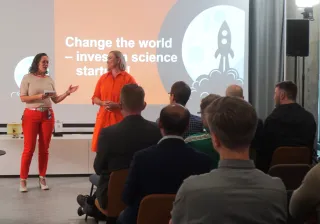Think Corner (Tiedekulma) in Helsinki was full of curious and enthusiastic people from various universities and companies on Friday, 18th January 2019. The Synbio Powerhouse innovation ecosystem was officially launched with over 120 guests and 12 speakers.
If you are wondering, what this Synbio Powerhouse is about: It is a VTT-driven ecosystem in Finland for everyone involved in synthetic biology. Like ecosystems in nature, industrial ecosystems include all possible places, people and companies who need to work together. The idea is to bring scientists closer to real commercial problems and thus create new business and planet saving innovations.
Synbio Powerhouse is managed by Co-Creation Manager Tuula Palmén from VTT and Professor Merja Penttilä from VTT and Aalto University.
The Powerhouse Ecosystem is currently funded by VTT, Sitra, Jenny and Antti Wihuri Foundation and Aalto University. It includes cutting-edge laboratory infrastructure such as robotics and automated parallel bioreactor systems, for which all the companies and researchers have access to.
The Powerhouse also initiates two interesting functions: BioGarage and BioBusiness Builder, which help anyone to test bold ideas in the lab and to create new business out of them.
In the event Merja Penttilä presented how synthetic biology (synbio) in general can help us to replace fossil fuels in general and fossil-based materials with renewal options. Enzymes can, for example, degrade cellulose to sugars, which can be further converted in living cells to bioethanol, biopolymers, other materials, chemicals, food and medicines. Synthetic biology as a technology has developed dramatically during the past few years, and it would be now optimal time for companies to start using it. The new Synbio Ecosystem is trying to make this transition as easy as possible.
The importance of collaboration between companies was highlighted in the launch event by speakers and panelists, including Matti Heikkilä, CTO at MetGen Oy. He described how finding non-competing partners and getting peer support in EU projects has benefited their enzyme-based business.
Visions for collaboration were not limited only to different commercial partners, but included also teamwork within different fields of science. Jussi Manninen, Executive Vice President of VTT, and Samuel Kaski, Professor at Aalto University, both mentioned that we should take advantage of Finnish expertise in IT, especially in artificial intelligence and machine learning. It is vital to use them with biosciences, and this is what is already happening in USA and other countries.
Synthetic biology can also be combined with arts and design. As an example, Aivan design agency in Helsinki has created a set of headphones from entirely microbial produced materials. If you are interested how they look, you might have a change to see them at Helsinki design week next September.
Michel Manach, Business Developer of Toulouse White Biotechnology (TWB) consortium was one of the keynote speakers of the event. TWB got governmental funding of 20 million euros in 2012 to boost up biotechnology applications in businesses. They have gathered over 40 private and public partners and investors to the consortium to benefit from the shared laboratory infrastructure and interaction with researchers. In their concept, the rules for all members are set ahead to ensure benefits for both companies and researchers. So far the consortium has created six new start-ups. According to Manach, the idea is to simplify academic rules, understand the industrial needs better and to find together solutions for sustainable development. TWB and VTT belong to same European network called IBISBA, whose aim is to accelerate industrial biotechnology and synthetic biology implementation at European level.
Michel Manach, Business Developer of Toulouse White Biotechnology
The urgency of the climate change was discussed at the end of the event. Sirpa Pietikäinen, Member of the European parliament, emphasized the need to find solutions, which can solve constantly growing challenges. If current technologies are not solving our problems in the near future, we need to ask ourselves, are we focusing on the right questions, and are we bold enough to look for the right answers.
Sirpa Pietikäinen, Member of the European Parliament
Sini Harkki, Country Director at Greenpeace Nordic, reminded that if we want to limit global warming to 1.5oC, all used technologies should be carbon neutral or negative only in ten years' time. This sets the goal to the technologies we are developing today. Here synthetic biology has a lot to offer, considering for example photosynthetic and CO2 using microorganisms studied at VTT and at University of Turku.
The event ended up in panel discussion: From left: Tuula Palmén/VTT, Sirpa Pietikäinen/European Parliament, Sini Harkki/Greenpeace Nordic, Perttu Koskinen/Feedstock and Technologies, Matti Heikkilä/Metgen, Samuel Kaski/Aalto University and Merja Penttilä/VTT and Aalto University.
Writer: Research Scientist Anna Ylinen from VTT




